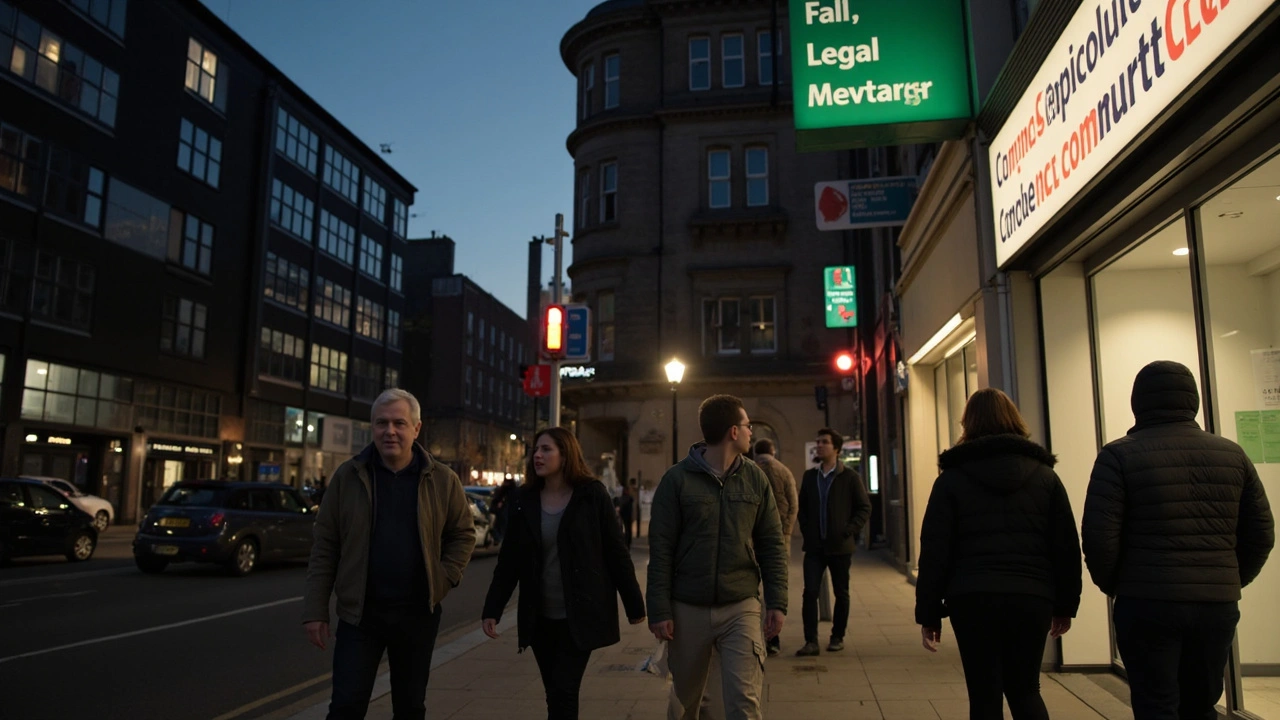Are Sex Workers Protected by Law? Legal Rights Explained

Ever wondered if sex workers actually have legal protection? The answer is mixed and messy. It often depends on where you are, the type of work, and even who you know. Some countries or states offer real rights—others are downright risky.
If you work in or around sex work, legal details really matter. Knowing your rights can make a huge difference in how safe you are, if you can call the police, or if you’re just left out in the cold. You’ll find that myths—like "sex work is always illegal"—don’t hold up when you dig into the fine print. That’s why it pays to get straight answers, not rumors or scare tactics.
- Direct Legal Answer for Sex Workers
- Key Rights and Protections at a Glance
- Sex Work Laws: What Counts, What’s Risky
- Different Types of Legal Protection
- How to Find Support and Stay Safe
- Common Questions about Sex Work and the Law
Direct Legal Answer for Sex Workers
The truth is, whether sex workers are protected by law depends a lot on location and the type of work they do. Some places treat certain kinds of sex work as a regular job with legal rights, while others see it as a crime. For example, in New Zealand, sex work has been fully decriminalized since 2003—this means sex workers there have clear rights to safety, health care, and can call police for help without risking arrest. On the flip side, in most of the United States, full-service sex work is still illegal, except for a handful of counties in Nevada. That changes everything about how safe, open, and protected folks can be at work.
Here’s a quick breakdown showing the differences in sex work laws in a few key places:
| Country | Legal Status | Protections |
|---|---|---|
| New Zealand | Decriminalized | Full worker rights, access to health, police, no risk for reporting crimes. |
| Germany | Legalized | Regulated industry, workers pay tax, some job benefits, but some restrictions remain. |
| United States (most states) | Criminalized | Few to no legal protections, high risk of arrest, very tough to report violence or abuse. |
| Sweden, Norway | Buyers criminalized | Workers not prosecuted, but still face stigma and trouble accessing services or police help. |
Ever notice how your exact legal status depends on which side of a border you stand? That’s why it always pays to know local laws, not just the general statement that "sex work is illegal." Even street-based workers, online escorts, or content creators can face totally different risks depending on small details in the law.
If you want a straight answer: in places where sex work is decriminalized or fully legal, yes, there are real legal protections. But where it’s still illegal, sex workers are usually left with little to no protection, leading to higher risks of violence and no safety net. It all comes down to local rules and how they’re enforced, so always check the details for your specific location. If you’re not sure about your area, reach out to groups and lawyers who know the real story on rights for sex workers in your city or country.
Key Rights and Protections at a Glance
If you've ever tried to figure out your legal rights as a sex worker, you know it's confusing. The rules are different everywhere, and sometimes they change overnight. But let’s break down what’s usually on the table.
Here’s what you might be protected by, depending on where you live and how the local laws are set up:
- Legal rights don’t always mean full protection. Even in spots where sex work is decriminalized, the law might only cover some types of work or certain acts.
- Labor rights can apply, but not everywhere. For example, in New Zealand, sex work is legal and protected by labor laws, so you can report unfair treatment, get contracts, and expect safe working conditions.
- In most of Europe, things get tricky. Places like the Netherlands give licensed sex workers legal status, but working outside regulated venues can still land you in trouble.
- Police protection is hit or miss. In some places, calling the police for help could get you arrested instead. Trust in enforcement is low where the law is hostile or unclear.
- Access to health care, legal aid, and support might be available through NGOs, especially when government help is limited. These groups step up when the standard safety net fails.
One quick tip: If you don’t know your rights in your area, reach out to local sex worker organizations. They know the local game and can share real info, not just rumors.
Don’t assume you’re protected—double check the details for your city or country. The differences between jurisdictions can be massive, even just a few miles apart.
Sex Work Laws: What Counts, What’s Risky
The law around sex workers is a patchwork—no one-size-fits-all answer. What you can and can’t do totally depends on your location and the type of work you do. Let’s break it down with real-world examples and what you need to look out for.
First off, in places like New Zealand and parts of Australia, sex work is fully legal and regulated. Workers can sign contracts, pay taxes, and go to the cops if they’re in trouble. Brothels are licensed, street work isn’t automatically a crime, and workplace safety is enforced just like any other job.
Contrast that to many parts of the United States, where selling sex is illegal almost everywhere except for a few counties in Nevada. That means if you’re caught working as a sex worker, you might face fines or even jail time. What’s wild is that some things related to sex work—like buying or promoting services—can get you into even more trouble than actually providing the service. Laws called “pandering” or “solicitation” are thrown around a lot, so check your local rules before making any moves.
Here’s what often separates legal and risky sex work:
- Legal (in some places): Working in a licensed brothel, independent escorting with full registration, or operations where workers pay taxes.
- Risky (many places): Street work, unlicensed massage parlors, advertising online, or having cash, condoms, and a phone in the wrong neighborhood (yes, some police use those as "evidence").
Some countries have “partial criminalization,” meaning it’s legal to sell sex but illegal to buy it, or vice versa. These setups can be confusing. For example, in Sweden, sex workers aren’t arrested, but their clients are. Sounds good for workers, but in reality, it pushes the industry underground and makes safety harder to manage.
So, what really counts is: always check your local law, don’t rely on old TV shows or rumors, and know that what’s totally fine in one city could get you arrested in the next town over. If you’re thinking about sex work, join local support groups online—they often have the latest info on what’s safe and what gets folks in trouble.

Different Types of Legal Protection
Legal protection for sex workers isn’t a one-size-fits-all thing. What counts as legal in New Zealand can be a crime in Texas. So, let’s break down the most common kinds of protection out there.
Legal rights for sex workers usually fall into these buckets:
- Decriminalization: The dream for many sex workers. Here, the law treats sex work just like any other job. New Zealand is often pointed to as the gold standard for this, where sex workers can call the cops if something goes wrong without worrying they’ll get arrested.
- Legalization: Sounds similar but isn’t quite the same. The sex trade is allowed, but with lots of rules—think registration, health checks, zoning, or licensing. Germany and parts of Nevada run with this model. There’s protection, but also plenty of paperwork and hoops.
- Partial Criminalization: Here, some parts of the business are allowed (like selling sex privately), but activities like brothel-keeping, soliciting, or advertising might still put you in hot water. Canada, Norway, and the UK flirt with versions of this model.
- Full Criminalization: No protection at all. Most forms of buying, selling, or organizing sex work are illegal. Places like Russia and much of the US handle things this way, which often scares workers away from reporting crimes.
No matter where you are, sex workers still have basic rights. Even in full criminalization countries, you’re protected against violence—at least on paper. But whether police actually help or blame the victim is hit or miss. In places with decriminalization, sex workers report way lower rates of violence and way more access to healthcare and support services.
Check out how different countries stack up:
| Country/Region | Legal Model | Worker Rights |
|---|---|---|
| New Zealand | Decriminalization | Legal, can report abuse, get contracts, access healthcare |
| Germany | Legalization | Legal, must register, access to social insurance |
| United States (Most states) | Full Criminalization | Illegal, almost no legal protection outside of select Nevada counties |
| UK | Partial Criminalization | Some activities legal, but brothels and solicitation illegal |
And here’s something plenty of folks don’t know: organizations like Amnesty International back full decriminalization because it’s proven to keep sex workers safer. Sweden’s “Nordic Model,” which criminalizes buyers but not sellers, sounds good on paper, but some studies say violence against sex workers actually went up.
If you want boots-on-the-ground help, check out local support groups or national orgs like the Sex Workers Outreach Project (SWOP) in the U.S. or the English Collective of Prostitutes in the UK. They know the local legal nitty gritty and can point you in the right direction fast.
How to Find Support and Stay Safe
When you’re working in the sex industry, staying safe and having support is not just smart—it’s crucial. Laws and attitudes can make life tricky, but you don’t have to go it alone. Here’s what you really need to know.
First off, many cities have dedicated organizations just for sex workers. Groups like SWOP-USA in the States, and UglyMugs in the UK and Australia, offer everything from free STI testing to legal tips and buddy systems. A quick web search using your local area and “sex worker support” pulls up resources you might not know about. Even if you’re not in a big city, online groups like Reddit’s r/SexWorkers and local Telegram channels can be goldmines for advice.
When safety’s on your mind, there are a few practical steps you can take:
- Set up a check-in system with a friend. Agree to text at the start and end of a job. No response? They know it’s time to call for help.
- Use apps like “SafeLet” or “Circle of 6” to alert someone quickly if things go wrong.
- Stick to well-lit, familiar spots when meeting new clients—and trust your gut if something feels off.
- Never share personal details you don’t need to—privacy is power.
If you run into trouble with the law or need help with paperwork, non-profits like Legal Aid or National Network of Abortion Funds sometimes help sex workers directly. Sex Work Law Reform groups can also guide you through legal minefields, like what to do if you’re questioned by police or need to report assault.
One overlooked tip: carry a cheat sheet with emergency numbers. Save contacts for a trusted friend, an activist hotline, and healthcare assistance in your phone under code names, just in case. And if you’re worried about your online safety, use encrypted chat apps and anonymize your accounts to keep business and private life separate.
The landscape is changing fast. More police stations and clinics now train staff to deal respectfully with sex worker cases, but not everywhere is perfect. If you feel mistreated, document everything—texts, phone calls, even badge numbers. Sometimes, just knowing you have a community behind you can change the whole experience for the better.
Common Questions about Sex Work and the Law
If you’ve hit a wall trying to figure out what’s legal and what’s not with sex work, you aren’t alone. Rules are confusing, and most people have a lot of questions. Let’s run through some clear answers to things almost everyone wants to know.
sex workers still don’t have equal legal protection everywhere. Here’s what people ask the most:
- Is sex work always illegal? No. Places like New Zealand and some parts of Australia have made sex work fully legal. In parts of Nevada, legal brothels exist. In other areas, even just talking about sex work could get you into trouble.
- Can sex workers call the police if something goes wrong? Technically, yes, but in reality, it’s tricky. In countries or states where sex work is criminalized, workers might get arrested just for reporting abuse. Where it’s decriminalized, they’re more likely to get help without fear of being arrested.
- Are clients breaking the law too? Depends on the location. In Sweden and Canada, for example, buying sex is illegal—but selling it isn’t. In other spots, both sides risk arrest.
- Do sex workers have access to health services? In decriminalized areas, yes. They can often get the same healthcare as anyone else without being judged or turned away. Where the work is illegal, even doctors sometimes report them.
- Can sex workers join a union or lobby for rights? Yes, some do. Groups like the Sex Workers Outreach Project and various local unions fight for legal rights, labor laws, and safety. But these only help if local laws don’t ban the work outright.
| Country | Legal Status | Police Protection? | Health Services? |
|---|---|---|---|
| New Zealand | Legal | Yes | Full access |
| Sweden | Legal to sell, illegal to buy | Partial | Limited |
| United States (Nevada Brothels) | Legal in some counties | Yes | Varies |
| Canada | Illegal to buy, legal to sell | Partial | Improved |
| India | Legal, but related activities banned | Limited | Limited |
If you’re in sex work or thinking about it, always check local laws before you start. Not sure where to begin? A quick online search for your city’s rules or talking to a trusted local rights group will help. And remember, some services—like legal hotlines or specialty health clinics—are set up to help sex workers, not get them in trouble.

